Overlooked and passed over?
By Starla Muhammad -Assistant Editor- | Last updated: Mar 22, 2016 - 10:04:45 AMWhat's your opinion on this article?
President’s failure to nominate Black woman to Supreme Court elicits anger, disappointment
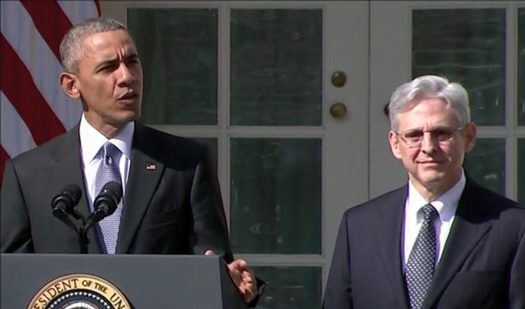
|
Just a few days after the conclusion of Black History Month, in the midst of Women’s History Month and in the waning months of his second term in office, many progressives and supporters thought President Barack Obama would further cement and bolster his legacy, by nominating a Black woman to the Supreme Court of the United States.
During his two terms, the president successfully nominated two Supreme Court appointees who were eventually confirmed, Justice Sonia Sotomayor, who is Puerto Rican and the first Latino on the court and Justice Elena Kagan, a White woman. So when Justice Antonin Scalia died in mid-February, leaving a vacancy, anticipation was high especially among Black women, that a Black female jurist would get the nod. After all, there had never been a Black woman appointed to serve on the nation’s highest court since its establishment in 1789 and Black women have been Mr. Obama’s most loyal and active supporters, defenders and constituents. That did not happen.
Instead, at a March 16 White House Rose Garden ceremony President Obama introduced another White male as his nominee, Judge Merrick Garland, 63, the current Chief Judge of the U.S. Court of Appeals for the D.C. Circuit. While some called the president’s choice a strategic and smart move, others were not impressed.
“I’m sure Judge Merrick Garland is an excellent judge, however President Obama could have selected Loretta Lynch, among many other African American attorneys who are qualified to serve as a Supreme Court justice. When will we see an African American female on the highest court of this land?” said a woman caller on veteran journalist Roland S. Martin’s radio program.
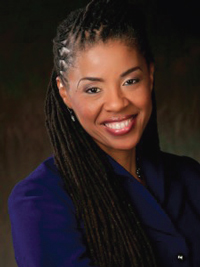
Dr. Avis Jones-DeWeever of Exceptional Leadership Institute for Women
|
What happened?
Outraged, disappointed and disheartened is what Dr. Avis Jones-DeWeever told The Final Call she felt, upon hearing the news. “To be perfectly honest, I was quite surprised with his last appointment in terms of Kagan. I did not see that coming at all. I really had anticipated at that point that a Black woman would be nominated,” said Dr. Jones-DeWeever who said she found out later that no Black women were seriously considered as candidates when Kagan was nominated in 2010. Justice Sotomayor was nominated and confirmed in 2009. Civil rights groups and Black organizations submitted lists of potential candidates to the White House after Justice Scalia’s death. Many Black women’s groups did the same, said Dr. Jones-DeWeever.
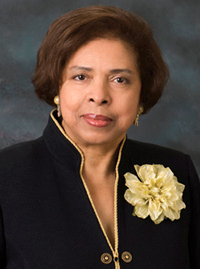
Dr. E. Faye Williams of the National Congress of Black women
|
The National Congress of Black Women was one of the groups that sent a list to the White House said the group’s president and CEO Dr. E. Faye Williams. No one from the White House responded she said.
“We do that as a rule. Every time there is a new president we supply a list of Black women who can fill all kinds of positions in an administration,” she said.
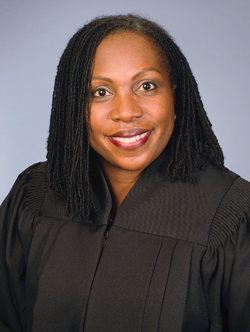
This photo provided by the U.S. Court of Appeals District of Columbia Circuit via Robin Reed Photography shows Judge Ketanji Brown Jackson. Judge Brown was allegedly considered by the Obama administration as potential Supreme Court nominee. President Obama instead nominated Judge Merrick Garland. Photo: AP/Wide World photos
|
“The fact that the attorney general turned it down, should tell us something because she went through this process to become attorney general and you remember all of the difficult things she went through and the long wait that she had,” Dr. Williams told The Final Call. It took six months for the Senate to confirm Atty. Lynch who replaced Eric Holder last year.
Atty. Lynch withdrew her name for consideration for the Supreme Court in a statement issued by a Justice Department spokesperson saying she was concerned with finishing up her tenure in her current position. Kamala Harris, California Attorney General was another name floated as a possible nominee. She also said she did not want to be considered for the post. Many Black women even championed first lady Michelle Obama, an accomplished attorney and Harvard Law graduate, as a possibility. Judge Ketanji Brown Jackson, a judge in the District Court for the District of Columbia, was also allegedly considered, by the Obama administration.
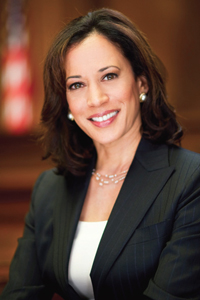
Kamala Harris, California Attorney General
|
Dr. Williams said different methods and strategies could have been implemented by Black organizations that could have possibly yielded a different result.
“We didn’t go out and protest, go out and just send in loads of names. We just kind of sent in a few names and left it at that and thought that the people who were looking at someone for judge would pick someone that we wanted. It didn’t happen so now we just have to move on,” she said.
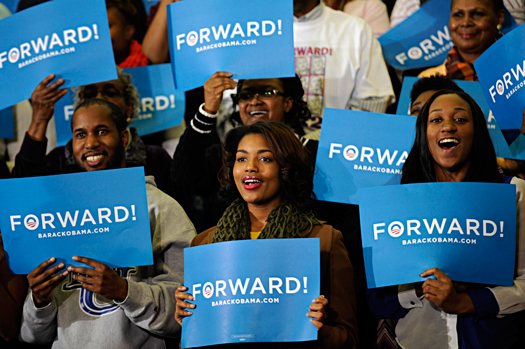
Supporters hold signs during first lady Michelle Obama’s campaign stop at Hampton University, Nov. 2, 2012 in Hampton, Va. Photo: AP/Wide World photos
|
Strategy or a blown opportunity?
Stating it is not a responsibility he takes lightly, Mr. Obama said Judge Garland was his choice after an “exhaustive process”. “I’ve sought the advice of Republican and Democratic members of Congress. We’ve reached out to every member of the Senate Judiciary Committee, to constitutional scholars, to advocacy groups, to bar associations representing an array of interests and opinions from all across the spectrum,” said the president. The pick was called pragmatic and a shrewd political move by some observers, as Judge Garland has garnered bipartisan praise during his career. This did little to quell disappointment and concern.
Mr. Martin, who was vocal on his radio program and his News One Now television show that President Obama should nominate a Black woman, did not understand the president’s choice.
“I don’t see how that gets the base excited,” he said on his radio program.
The self-inflicted wounds the Republicans have imparted on themselves would have made this the perfect time for the president to have nominated a Black woman, said Dr. Jones-DeWeever.
“Frankly it would have been a much more strategic move for him right now in terms of potentially holding the Republicans feet to the fire if he would have had a Black woman whom he was pushing, rather than a White male.”
Susan Rice, former U.S. Ambassador to the U.N. and current National Security Advisor, Valerie Jarrett, the president’s senior advisor and Atty. Lynch are all Black women and have high-ranking positions in Mr. Obama’s administration. However, none of them hold statutory cabinet positions except Atty. Lynch and she was just appointed in year seven of his eight year term, observed Dr. Jones-DeWeever. Black women broke turn out records to help Mr. Obama get elected at the tune of over 95 percent in 2008 and 2012. The optics of a bunch of old, White men saying no to or badgering a qualified Black woman would have energized Black women again to turn out in this November’s presidential and congressional elections noted Dr. Jones-DeWeever.
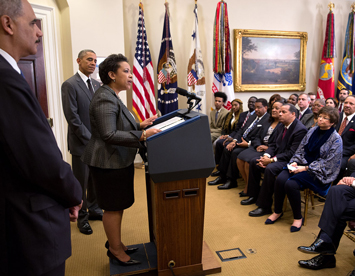
Loretta E. Lynch speaks after President Barack Obama announced that she is his nominee to succeed Attorney General Eric H. Holder, Jr., left, in the Roosevelt Room of the White House, Nov. 8, 2014. Photo: Official White House Photo/Pete Souza
|
There have been 112 Supreme Court Justices in history, all but three, the late Justice Thurgood Marshall and current Justices Clarence Thomas and Sotomayor, have been White. Three White women have served.
Jamilah Lemieux, senior editor of Ebony Magazine also weighed in. “If this is just a matter of making the symbolic gesture of nominating someone who would undoubtedly fail to be confirmed, why not make a powerful statement while doing so?” she opined in a March article titled, “The Audacity of Hoping for a Black Female SCOTUS Nominee.”
A few Senate Republicans, including Mark Kirk (R-Ill.) broke ranks with party leadership stating the Senate should “man up” and grant a hearing to Judge Garland.
With some of the critical issues and cases set to go before the court that specifically effect people of color and women, a Black woman justice would lend a unique and keen insight, said analysts. There is no motivation to “go to the mat” for this current candidate, said Dr. Jones-DeWeever.
“I certainly don’t feel it and I think that I’m not alone. It certainly would have made all sorts of sense. Not only because it’s the right thing to do but politically I frankly think a Black woman had a better chance to be approved because of the leverage that we would have been able to be put on the Senate (Republicans) to live up to the talk that they’re talking about, ‘not being racist and sexist’,” she said.
INSIDE STORIES AND REVIEWS
-
-
About Harriett ... and the Negro Hollywood Road Show
By Rabiah Muhammad, Guest Columnist » Full Story -
Skepticism greets Jay-Z, NFL talk of inspiring change
By Bryan 18X Crawford and Richard B. Muhammad The Final Call Newspaper @TheFinalCall » Full Story -
The painful problem of Black girls and suicide
By Charlene Muhammad -National Correspondent- » Full Story -
Exploitation of Innocence - Report: Perceptions, policies hurting Black girls
By Charlene Muhammad -National Correspondent- » Full Story -
Big Ballin: Big ideas fuel a father’s Big Baller Brand and brash business sense
By Bryan Crawford -Contributing Writer- » Full Story






 Click Here Stay Connected!
Click Here Stay Connected!








